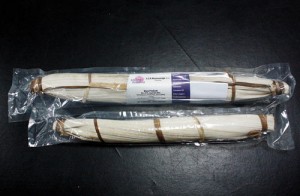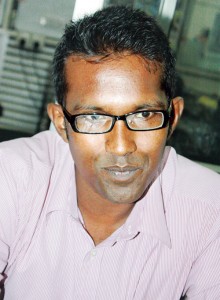Lanka’s newest product – designer Kalu Dodol
Thinking big does not mean you have to start big. Most successful enterprises start in a small way, especially if they are developing on enhancing an existing product, which was the case for Chathura Munaweerage, who wants to make his signature Kalu Dodol the next generation’s chocolate.
“I left many 9 to 5 jobs because of the urge to control my own life more and find a way to work for myself. I wanted to be somewhere where I didn’t have to report to 15 people,” he says, setting the pace for discussing his designer Kalu Dodol venture with the Business Times.

The product
The spark to start making Kalu Dodol came after he was married. “My origins are southern, but I was brought up in Colombo and schooled at Ananda College. I had heard that those in the South make great Kalu Dodol, but I experienced it first hand after marriage,” he smiles. With his BSc in statistics, mathematics and physics he did crucial math on marketing, presenting the product. “This is an ethnic product using coconut, jaggery, rice flour, salt, spices and cashews,” he says. He says that his biggest issue was selling the product, adding that he decided on a business model which will help him get close to his customers – direct sales. Producing some 800 kg per month, his client base comprises banks and leasing firms along with some individual clients.
“In the beginning I learned from the school of hard knocks and it’s served me well in the long run,” he reminisces. He says that the start was tough – trial and error, customers weren’t convinced at the beginning, etc. Then it took him a few years to get it together, he said, adding that this product is 100 per cent organic.
“We pay special attention to creating a community around our products. So instead of just getting a product our every month, we want to create a community,” he said, stressing that improving customer experience is priority number one for him at present and he says this needs a high level of discipline, dedication, persistence and creativity as well as a lot of work. He says the greatest challenge as a micro-entrepreneur is the capability for decision-making which has always been a challenge. He said that the ability to manage employees and accounts is easy as it is still a cottage industry with just three workers.

Chathura Munaweerage
Access to relevant markets is also an issue, he says, adding that opportunities has always affected the ability of micro, small and medium enterprises such as him to grow and become more profitable. “I remain realistic and now with my model of door to door sales, I investigate the market and its needs and try to be objective, and I look for opportunity.”
He says another challenge for his product is the quality specifications for the selected market.
“My packing in Puwak leaves palletise well and are strong enough to withstand humidity and weight when stacked. However I’m looking to add value to this product,” he says, adding that innovative packaging will make all the difference.”
In terms of sales, he says currently he has peak and off peak seasons.
“I am looking to adapt to new challenges and opportunities for further development and identify innovation opportunities. It’s important for my products to be presented as attractively as possible to customers while maintaining the image of this whole business as professional as possible.”
He says by offering something different that no one else is selling you can be the sole supplier to the market. “The opportunity to value-add to a product will be of importance to ensuring your uniqueness and quality.”
He’s careful in choosing his core raw material. “The coconuts are fsrom the Southern and Western regions which are best suited for Kalu Dodol,” he says, adding that the unique taste of the product depends on sourcing the right material.
He wants to produce this on an industrial scale and make it a fast moving consumer good. “But for this attitudes need change,” he says, noting that his knowledge in statistics has assisted in recognising clients and trends while mathematics and physics has helped him design the necessary machines.
“I design all my machines and I started with an industrial scale coconut milking machine.”
What he is in dire need at the moment is a serious investor who can support him in this business.


